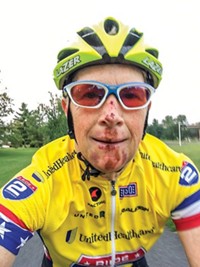Advertisement
Grab your lab coat. Let's get started
Welcome!
Welcome!
Create an account below to get 6 C&EN articles per month, receive newsletters and more - all free.
It seems this is your first time logging in online. Please enter the following information to continue.
As an ACS member you automatically get access to this site. All we need is few more details to create your reading experience.
Not you? Sign in with a different account.
Not you? Sign in with a different account.
ERROR 1
ERROR 1
ERROR 2
ERROR 2
ERROR 2
ERROR 2
ERROR 2
Password and Confirm password must match.
If you have an ACS member number, please enter it here so we can link this account to your membership. (optional)
ERROR 2
ACS values your privacy. By submitting your information, you are gaining access to C&EN and subscribing to our weekly newsletter. We use the information you provide to make your reading experience better, and we will never sell your data to third party members.
Safety
Re: Eye protection in Cuba lab photos
June 5, 2017
| A version of this story appeared in
Volume 95, Issue 23
Readers responded to Jyllian Kemsley’s explanation of why C&EN’s April 24 cover story included photos with people lacking goggles.
Even in India we don’t get to wear eye protection. Even in some universities they don’t have compulsion to wear aprons (lab coats) for undergrads. Actually it is not lack of funding, it’s the lab culture. Moreover, students have to buy their protective gear, not the university, which surely doesn’t include eye gear and gloves.
Sidharth Walia
Good job on the photo. We all noticed and, hopefully, we understood what it indicated about the eye-protection culture in their labs. It was a news story which showed their environment as it is. That is how it should have been shown.
Frank Blum
I believe that the photo suggests that despite warnings and admonitions, eye protection is not really that important. I believe that more than budgets are in play here. I believe that the culture suggests that eye protection is not really needed. But the question for C&EN is why was the photo used? We cannot determine what experiments are being done. We can see what the students are doing. It looks a little crowded but that may be because everyone wanted to be part of the photo. Why did you choose to use this photo rather than one of an empty lab or of students in a classroom or of something else relevant to the article? And why, once this picture was chosen, did you not specifically note that there was no eye protection and that this is dangerous?
Joe Olechno
Along with the majority of commenters, I endorse publishing a photo showing the harsh reality of this teaching lab at a Cuban university. Brings back memories of my high school chem lab in Detroit in the early 50s.
Along with no personal protection was lax supervision of students doing their lab experimental exercises. I remember that one of my setups of a distillation apparatus blew up because I made the apparatus connections airtight instead of vented. There was no pause step in the instructions for inspection and approval by the teacher.
Frank Snitz
Twenty to 30 years ago it was common to have photos of lab technicians without safety glasses. We live in a more safety-conscious world today due to the high cost of industrial accidents. In modern times it is appropriate for group photos in a laboratory to wear the required PPE (personal protective equipment), and that should include safety glasses.
Glenn Shiveler
As a chemist educated in both Latin America and Europe, I completely agree that the photograph was absolutely appropriate because of its accuracy and as a stark contrast to the conditions faced in the U.S. and other parts of the world. I am certain most of the comments on the lack of protective eyeglasses emanate from an American-centered point of view that cannot conceive of other people carrying on the same tasks in a different way. Most developing countries are not so obsessed (or just do not have the budgets) to impose too strict security measures. And we do just fine, honestly.
J. Rubén Gómez Castellanos
I appreciate that you wanted to show the lab environment and safety culture of the area, but at the same time, if C&EN is aware of the deficiency, should you address it?
After the photo and interviews were conducted, did you offer to provide any PPE? Were they aware of the lack of PPE?
Daniel Cain via Facebook
Editor’s note: In general, journalists observe and report. It would be considered a conflict of interest for a journalist to get directly involved by providing personal protective equipment.



Join the conversation
Contact the reporter
Submit a Letter to the Editor for publication
Engage with us on Twitter